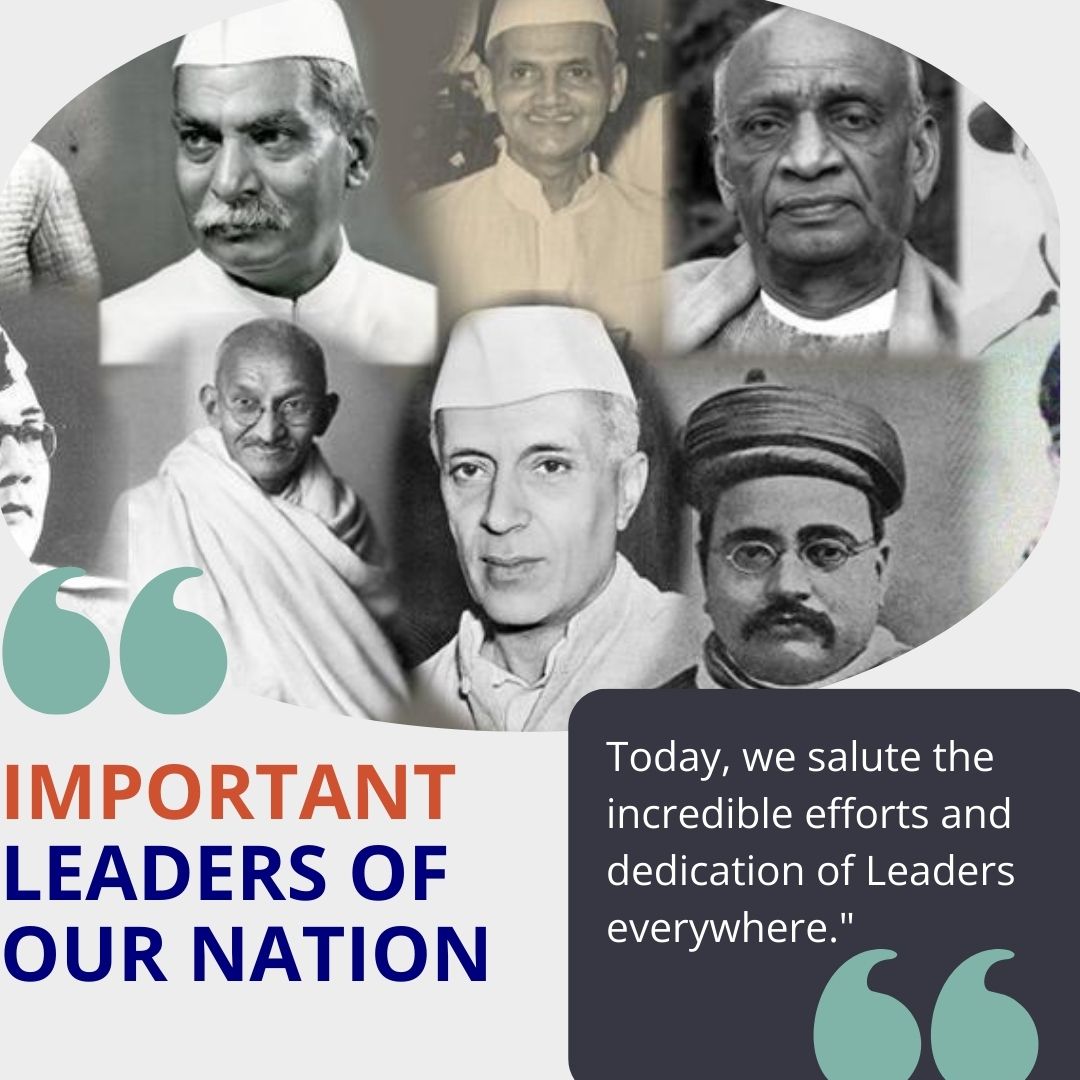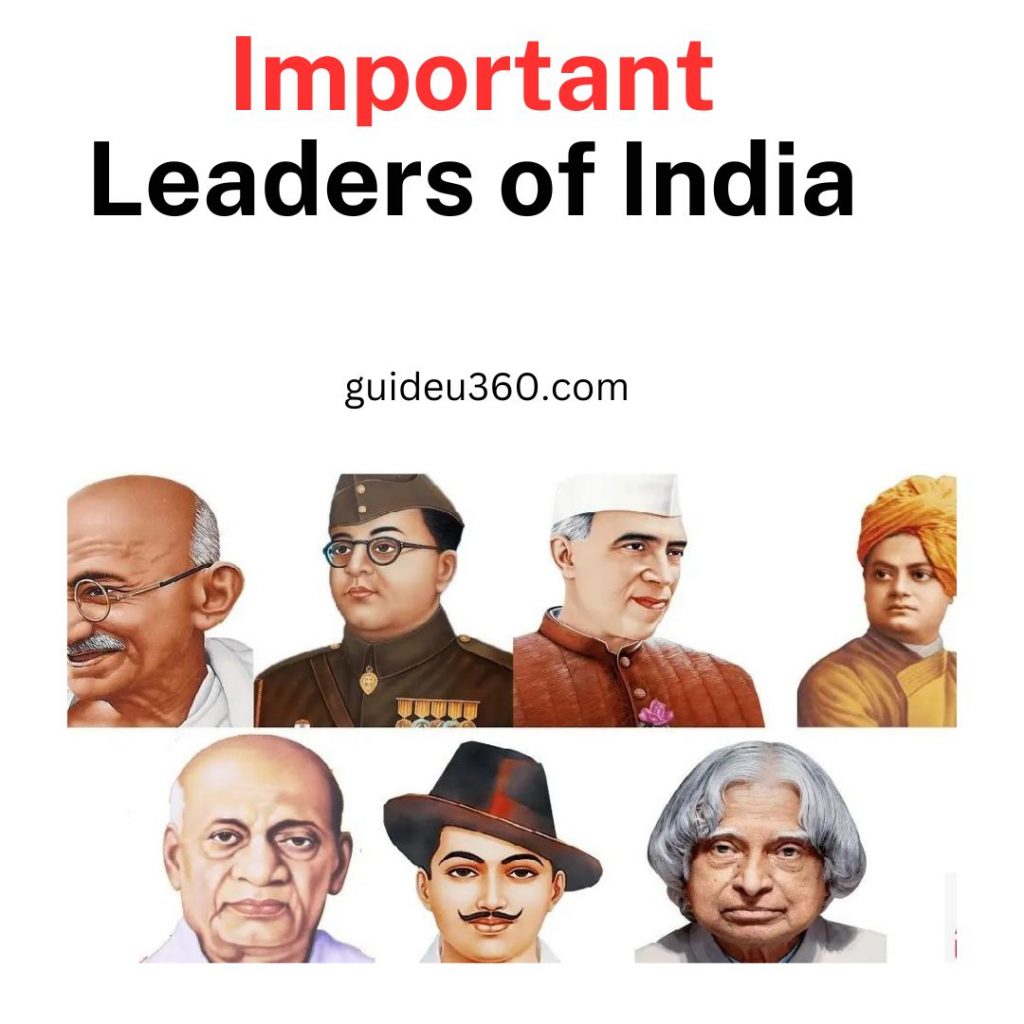India’s journey to independence and its subsequent development as a nation has been shaped by the contributions of numerous visionary leaders. These leaders have played pivotal roles in various spheres, including politics, social reform, and economic development. Here is a detailed look at some of the most important national leaders in India’s history.

Mahatma Gandhi (1869-1948)
Mahatma Gandhi, also known as the Father of the Nation, was the preeminent leader of the Indian independence movement. His philosophy of non-violence (Ahimsa) and civil disobedience inspired millions to fight for freedom without resorting to violence.
Key Contributions:
- Non-Cooperation Movement (1920-1922): Urged Indians to withdraw from British institutions.
- Salt March (1930): Protested the British monopoly on salt, sparking widespread civil disobedience.
- Quit India Movement (1942): Called for an end to British rule in India.
Jawaharlal Nehru (1889-1964)
Jawaharlal Nehru was a central figure in Indian politics before and after independence. He was the first Prime Minister of India and played a key role in shaping modern India’s political and economic policies.
Key Contributions:
- Economic Reforms: Implemented socialist-inspired economic policies and established a mixed economy.
- Non-Aligned Movement: Co-founded this movement during the Cold War, advocating for an independent path in international relations.
- Educational Development: Focused on building educational institutions like the Indian Institutes of Technology (IITs).
Dr. B.R. Ambedkar (1891-1956)
Dr. B.R. Ambedkar was a social reformer, economist, and the principal architect of the Indian Constitution. He championed the rights of the marginalized and worked tirelessly for social justice.
Key Contributions:
- Drafting the Constitution: Played a pivotal role in framing the Indian Constitution, ensuring fundamental rights and social justice.
- Social Reforms: Advocated against caste discrimination and worked for the upliftment of Dalits.
- Economic Thoughts: Contributed to the development of India’s economic policies.
Sardar Vallabhbhai Patel (1875-1950)
Sardar Vallabhbhai Patel, known as the Iron Man of India, was instrumental in uniting the princely states into a single, independent nation. As the first Deputy Prime Minister and Home Minister of India, he played a crucial role in national integration.
Key Contributions:
- Integration of Princely States: Successfully integrated over 500 princely states into the Indian Union.
- Reorganization of States: Advocated for a strong, unified central government.
- Farmer’s Leader: Played a key role in the Bardoli Satyagraha, a farmers’ movement against oppressive taxation.
Important Wars of the 20th Century
Indira Gandhi (1917-1984)
Indira Gandhi, the first and only female Prime Minister of India, served four terms and was known for her strong leadership. Her tenure was marked by significant events and controversial decisions.
Key Contributions:
- Green Revolution: Implemented policies that transformed India from a food-deficient to a food-surplus country.
- Emergency (1975-1977): Imposed a state of emergency, which led to widespread political repression.
- Operation Blue Star: Ordered the military operation to remove militants from the Golden Temple, leading to her assassination.

Lal Bahadur Shastri (1904-1966)
Lal Bahadur Shastri was the second Prime Minister of India and is remembered for his simplicity, humility, and strong leadership during challenging times.
Key Contributions:
- White Revolution: Promoted the dairy industry and the National Dairy Development Board.
- Jai Jawan Jai Kisan: Coined this slogan, emphasizing the importance of soldiers and farmers.
- Leadership during the 1965 War: Led India during the Indo-Pakistan War of 1965 and achieved a ceasefire agreement.
Dr. A.P.J. Abdul Kalam (1931-2015)
Dr. A.P.J. Abdul Kalam, also known as the Missile Man of India, was a renowned scientist and the 11th President of India. His contributions to India’s space and missile programs are significant.
Key Contributions:
- Pokhran-II Nuclear Tests: Played a crucial role in India’s successful nuclear tests in 1998.
- Vision 2020: Advocated for India’s development plan to transform into a developed nation by 2020.
- Inspiring Leadership: Inspired millions through his vision, writings, and interaction with students.
Rajiv Gandhi (1944-1991)
Rajiv Gandhi, the youngest Prime Minister of India, initiated numerous technology and economic reforms. His tenure was marked by a push towards modernization.
Key Contributions:
- Technology and Telecom Revolution: Promoted computerization and the establishment of MTNL and VSNL.
- Panchayati Raj: Advocated for decentralization and the empowerment of local governments.
- Education Policy: Emphasized the importance of education and launched the National Policy on Education in 1986.





